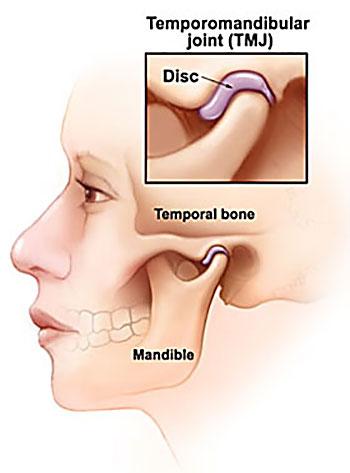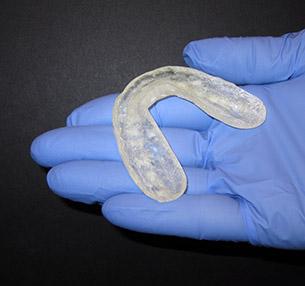TMJ Pain and Headache Treatment in South Fort Worth
Effective, Gentle Treatment for TMJ Disorder
Your Jaw Joint Might Be Causing You Headaches and Pain!
 It may come as a surprise to learn that a misaligned jaw joint can cause headaches and face, neck and shoulder pain, as well as other unpleasant symptoms. The jaw joint, officially called the temporomandibular joint or “TMJ,” is a hinged joint that moves the lower jaw up or down when we talk, eat and yawn.
It may come as a surprise to learn that a misaligned jaw joint can cause headaches and face, neck and shoulder pain, as well as other unpleasant symptoms. The jaw joint, officially called the temporomandibular joint or “TMJ,” is a hinged joint that moves the lower jaw up or down when we talk, eat and yawn.
The jaw joint muscles can become strained to the point of pulling the jaw joint out of alignment. Various things can cause this: the culprit could be trauma, a misaligned bite, habitually grinding and clenching your teeth, or any activity that continually puts undue pressure on the jaw joint. As time goes by, the surrounding bones, muscles and nerves can also become aggravated and the symptoms can become more severe.
Most of the headaches, pain and other symptoms related to jaw joint disorders can be alleviated by putting the TMJ back into alignment and returning your jaw to its optimal position. Dr. Warren will use a state-of-the-art CT scanner to view the bones of your TMJ joint. If your TMJ issues are caused by clenching or grinding your teeth or by a poor bite alignment, Dr. Warren can often help correct these issues by fitting you with a custom night guard or by adjusting your bite.
Symptoms That Indicate a Malfunctioning TMJ
Typical symptoms of a TMJ disorder include:

- Headaches
- Earaches
- Neck pain
- Facial pain or tenderness around the jaw joint area
- Upper back and shoulder pain
- Toothaches
- Difficulty opening the mouth very wide
- Ringing in the ears (tinnitus)
- Clicking, snapping or popping noises when opening and closing the mouth
- Jaws that “lock up”
- Difficulty chewing
Causes of TMJ Problems
- Stress – Stress can cause you to unknowingly tighten up your facial, jaw, neck and shoulder muscles.
- Misaligned bite – Teeth that do not come together properly can disrupt the alignment of your jaw and its sur-rounding muscles. As your jaw strains to perform its normal functions, increased stress on your muscles and nerves can lead to headaches, neck and shoulder pain and other undesirable symptoms. Some of the reasons for a bite misalignment include broken-down or worn teeth, injury or genetic malformations.
- Arthritis in the jaw joint
- Teeth grinding and clenching (bruxism) – Grinding and clenching your teeth puts strain on the muscles of your jaw. It can also con-tribute to the wearing down of your teeth, which could lead to a misaligned bite and create further stress on your jaw joint.
- Trauma from injuries
- Dislocation of the jaw joint
Treating TMJ Issues
Dr. Warren’s first step will be an oral and facial examination. He will look and listen for indicators that your jaw is malfunctioning, such as popping noises when you open and close your mouth. He will also want to know what symptoms you have been experiencing and how often. Dr. Warren will then take a CT scan of your jaw for an in-depth look at the bones associated with your jaw joint.
We use minimally invasive methods to help relieve pressure on the TMJ and correct its alignment. Depending on your circumstances, Dr. Warren will provide you with a night guard or he may adjust your teeth’s biting surfaces in a procedure called “occlusal equilibration.” This involves adjusting your bite so that your teeth come together evenly when you close your jaws. He may also combine these treatments for the greatest effectiveness. These gentle methods can help bring you relief from TMJ disorder symptoms.
Night guard
 A night guard is a custom plastic appliance that is worn at night during sleep. Patients with TMJ issues often clench and grind their teeth at night while sleeping. This puts undue pressure on the muscles and ligaments of the jaw joint while also wearing down the biting surfaces of the teeth. The night guard keeps the top and bottom teeth from touching, preventing grinding and clenching.
A night guard is a custom plastic appliance that is worn at night during sleep. Patients with TMJ issues often clench and grind their teeth at night while sleeping. This puts undue pressure on the muscles and ligaments of the jaw joint while also wearing down the biting surfaces of the teeth. The night guard keeps the top and bottom teeth from touching, preventing grinding and clenching.
Night guards can help alleviate pressure on the jaw joint (and reduce discomfort) by giving the jaw muscles a chance to relax.
Bite adjustment
Dr. Warren will do a bite analysis to determine if a bite adjustment is needed in your case. He can perform gentle recontouring of any chewing surfaces that are not connecting properly. A bite adjustment could even include repairing or replacing a worn crown or other tooth restoration, depending on the circumstances. Dr. Warren will discuss all of your options and answer any questions.
To make an appointment, call 817‑241‑2820 or click here to request an appointment online.
